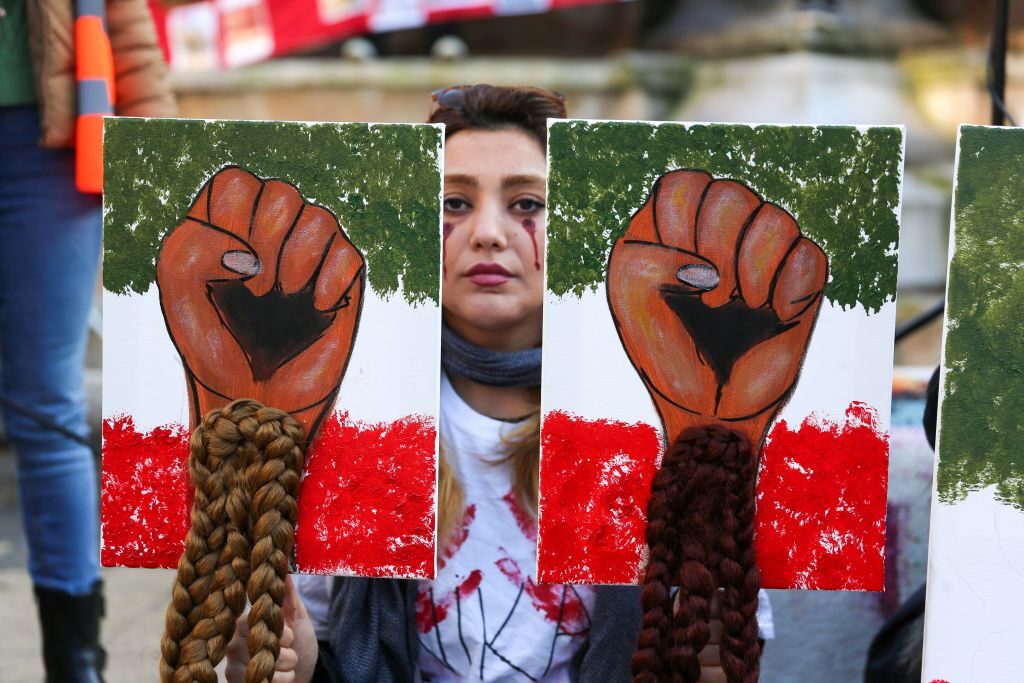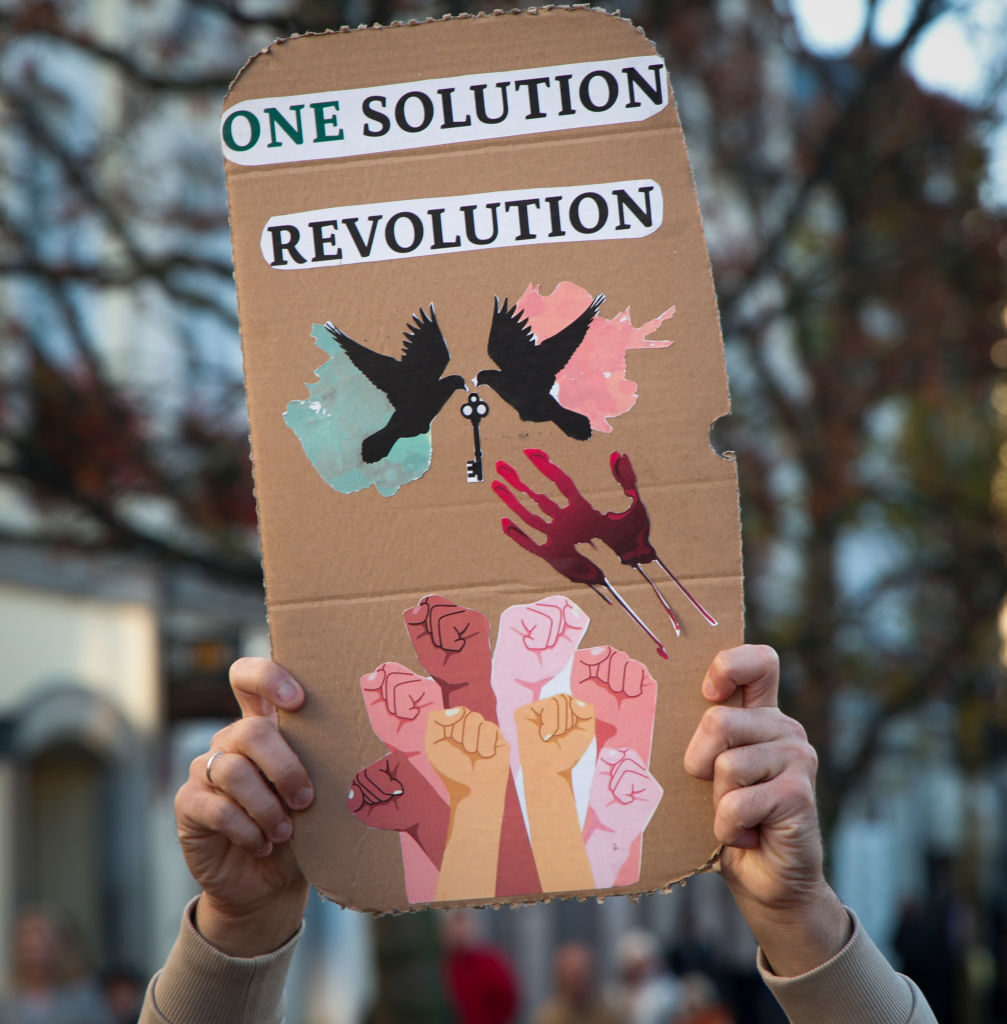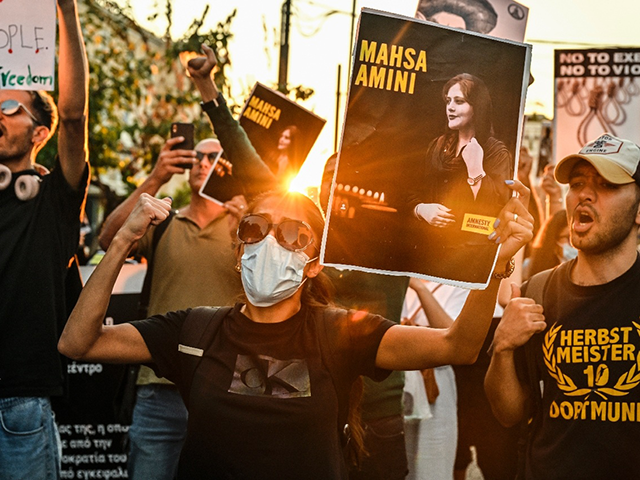A court run by Iran’s Islamic Revolutionary Guard Corps (IRGC) on Sunday imposed the first death sentence against a member of the nationwide protest movement that took to the streets after the thuggish “morality police” killed a young Kurdish woman named Mahsa Amini for wearing her hijab improperly.
The Iranian judiciary charged over 750 people with “riot” offenses over the weekend, bringing the total charged in connection with the Amini protests to over 2,000.
According to a news service linked to the Iranian judiciary, the person sentenced to death was charged with “setting fire to a government building, disturbing public order, assembly and conspiracy to commit a crime against national security,” and being “an enemy of God and corruption on earth.” The last charge is one of the most serious under Iranian law.
IRGC courts sentenced five other people to prison sentences of five to ten years for allegedly violating public order and endangering national security.

A woman holds signs with womens hair during a demonstration in honor of Jina Mahsa Amini and the other protesters killed under the orders of the Islamic Republic at The Place Joachim du Bellay in Paris, on November 13, 2022. (Michel Stoupak/NurPhoto via Getty Images)
Iranian media reports said the 2,000 people charged to date are facing allegations such as “incitement to killing,” “harming security forces,” “propaganda against the regime,” and “damaging public property.” Some of these detainees have been charged with potentially capital offenses like “corruption on Earth” and “war against God.” Security forces have killed at least 300 protesters in the streets.
Iran’s state news agency IRNA claimed on Sunday that about 100 young detainees were released after signing pledges that they would not participate in further “riots.”
After eight people were charged with potentially capital offenses in late October, the United Nations issued a statement to Iran to “stop using the death penalty as a tool to squash protests” and “immediately release all protesters who have been arbitrarily deprived of their liberty for the sole reason of exercising their legitimate rights to freedom of opinion and expression.”
The U.N. said it was alarmed by the number of Iranian lawmakers demanding the execution of protesters.
“With the continuous repression of protests, many more indictments on charges carrying the death penalty and death sentences might soon be issued, and we fear that women and girls, who have been at the forefront of protests, and especially women human rights defenders, who have been arrested and jailed for demanding the end of systemic and systematic discriminatory laws, policies and practices might be particularly targeted,” the U.N. panel of sixteen human rights experts said.
The European Union on Monday announced new sanctions against 29 individuals and three organizations in Iran accused of persecuting peaceful demonstrators.
German Foreign Minister Annalena Baerbock said the sanctions would “send a clear message to those who think they can suppress, intimidate and kill their own people without consequences,” particularly members of the “inner circle of power of the Revolutionary Guards and the structures financing them.”
Fifteen Iranian individuals and entities linked to the death of Mahsa Amini were sanctioned by the European Union last month. The new sanctions targets include four members of the “morality police” squad that arrested Amini, high-ranking IRGC officials, and Iranian Interior Minister Ahmad Vahidi.

A woman holds a sign with the words ‘One solution Revolution’ at the University of Warsaw in Warsaw, Poland on 06 November, 2022. Authorities in Iran have been cracking down on mass protests across the country since the death of Mahsa Amini in September. (STR/NurPhoto via Getty)
The United Kingdom announced sanctions against 24 Iranian officials “responsible for heinous human rights violations” on Monday, including communications minister Issa Zarepour and chief cybersecurity official Vahid Mohammed Naser Majid, who were held accountable for shutting down the Internet and blocking social media apps to suppress the protests.
The Iranian Foreign Ministry responded on Monday by claiming it has evidence that foreign powers are orchestrating the Amini protests. At least nine of the people Iran has arrested in connection with the protests are foreign nationals.

COMMENTS
Please let us know if you're having issues with commenting.